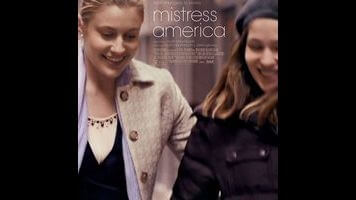Just how New York is Brooke, the free-spirited scenester Greta Gerwig plays in Noah Baumbach’s new comedy, Mistress America? Well, for starters, she actually lives in Times Square, squatting in a commercially zoned studio space mere blocks from the epicenter of Manhattan tourism. Brooke doesn’t just embrace the fabled big-city experience. She embodies it, juggling boyfriends and careers—when not working as an interior decorator, running a spin class, or singing in a band, she harbors dreams of opening a trendy restaurant—while treating every day and night like a cross-borough bacchanal. Baumbach, by now an old pro at affectionately skewering twentysomething culture, has built just about all of his movies around a shamelessly narcissistic New Yorker. Here, though, he seems to have created something close to New York narcissism incarnate, a character whose every line of self-involved dialogue evokes an outsider’s mythic idea of how a plugged-in urbanite might talk, act, and live.
Exasperating as she sounds, Brooke is perhaps equal parts endearing, for a couple of very good reasons. For one, she’s been gifted the gangly charm of Greta Gerwig, who co-wrote the film with Baumbach, her squeeze; as in their last collaboration, the terrific Frances Ha, Gerwig’s involvement seems to have softened the director’s frequently barbed edges. Secondly, Brooke is viewed chiefly through the rose-colored eyes of another character, lonely Barnard freshman Tracy (Lola Kirke, younger sister of Girls star Jemima Kirke), whose mother is marrying Brooke’s father. Struggling to make friends or good grades during her first semester, Tracy reaches out to her stepsister-to-be, and after one endless night in her company, quickly becomes infatuated with her cosmopolitan NYC lifestyle—so much so that she works Brooke, a character if ever there was one, into the short story she submits to her school’s prestigious literary society.
Outside of maybe Edgar Wright, there’s no working director better at wringing laughs from montage, and the film’s early scenes, which depict Tracy’s less-than-perfect college experience, unfold in a fast and funny blur of social pratfalls. (Baumbach’s recent strategy of staging scenes like one-liners, dropping in on a situation and cutting immediately out on a punchline, continues to pay big comic dividends.) The dialogue, too, has that familiar snap and pop, especially once Tracy and Brooke slide into an unbalanced sisterhood, the former playing wide-eyed Nick Carraway to the latter’s bullshit-spouting Gatsby. Even when the script flirts with glibness (as when Brooke says she’s read that television shows are “the new novel”), the actors deliver their bon mots with impeccable timing. Kirke is the big discovery: Playing a character radically different than the one she briefly but memorably portrayed in Gone Girl, the actress credibly evinces both naiveté and the burgeoning confidence of someone slowly realizing she may actually be the smartest person in the room.
Mistress America is a kicky hybrid, marrying the filmmaker’s gift for quotable youth satire—first honed in his first feature, Kicking And Screaming—to an old-fashioned screwball energy. Around the midway mark, the film sends Tracy, her classroom crush (a very funny Matthew Shear), his insanely jealous girlfriend (Jasmine Cephas Jones), and Brooke on a road trip to Vermont, where Gerwig’s cash-strapped bohemian plans to hit up some wealthy, estranged friends for money. At a swanky suburban residence, the film transforms into a full-fledged farce: Characters dart in and out of frame, jokes fly fast and hard, and several supporting characters—Brooke’s still-smitten ex (Michael Chernus), a pregnant woman (Cindy Cheung) waiting for a ride, a testy neighbor—create a storm of yammering activity. A one-time disciple of Peter Bogdanovich, master of the modern farce, Baumbach certainly has the right timing for this broad, playful material. But not all of the actors seem in the same register, and some scenes take on the distinct feel of an awkward community-theater production. There’s a groan for every belly laugh.
Still, you have to admire Baumbach and Gerwig’s willingness to just go for it, to attempt a distinctive spin on a classic comic scenario. The film makes an interesting companion piece to Baumbach’s other 2015 effort, this spring’s cross-generational portrait While We’re Young. Both follow a square seduced by the charms of a pretentious cool kid, and while Young made a late bid to examine the ethics of nonfiction, Mistress America does the same for fiction, eventually questioning whether its collegiate heroine has the right to interrogate Brooke’s life for her own creative gain. (Cram the two movies together on one bill and you’ve got Baumbach’s Storytelling.) This new-new Baumbach isn’t necessarily better than the old-new Baumbach; Young felt meatier, with a stronger sense of who its neurotic New Yorkers were. But that film didn’t have Gerwig, bringing warmth, wit, and loopy star power to a character—a human bulldozer of incorrigible extroversion—as fictional as the Big Apple you see only on the big screen.

 Keep scrolling for more great stories.
Keep scrolling for more great stories.
